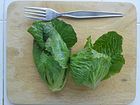Note: This is a project under development. The articles on this wiki are just being initiated and broadly incomplete. You can Help creating new pages.
Difference between revisions of "Diplazium esculentum - Vegetable fern"
(→Commonly seen growing in areas) |
(→References) |
||
| Line 88: | Line 88: | ||
<references> | <references> | ||
| − | <ref name="chemical composition">[http://www.jocpr.com/abstract/nutritional-and-phytochemical-screening-and-total-phenolic-and-flavonoid-content-of-diplazium-esculentum-retz-sw-from-ph-3608.html | + | <ref name="chemical composition">[http://www.jocpr.com/abstract/nutritional-and-phytochemical-screening-and-total-phenolic-and-flavonoid-content-of-diplazium-esculentum-retz-sw-from-ph-3608.html Pharmaceutical Research]</ref> |
| − | <ref name="Leaf">[https://indiabiodiversity.org/species/show/242436 | + | <ref name="Leaf">[https://indiabiodiversity.org/species/show/242436 Diagnostic]</ref> |
| − | <ref name="How to plant/cultivate">[http://tropical.theferns.info/viewtropical.php?id=Diplazium+esculentum | + | <ref name="How to plant/cultivate">[http://tropical.theferns.info/viewtropical.php?id=Diplazium+esculentum Cultivation details]</ref> |
</references> | </references> | ||
Revision as of 17:11, 20 May 2019
Vegetable fern is an edible fern found throughout Asia and Oceania. It is probably the most commonly consumed fern. The plant is bipinnate with long brownish petioles, and the petiole base is black and covered with short scales.
Contents
- 1 Uses
- 2 Parts Used
- 3 Chemical Composition
- 4 Common names
- 5 Properties
- 6 Habit
- 7 Identification
- 8 List of Ayurvedic medicine in which the herb is used
- 9 Where to get the saplings
- 10 Mode of Propagation
- 11 How to plant/cultivate
- 12 Commonly seen growing in areas
- 13 Photo Gallery
- 14 References
- 15 External Links
Uses
Rheumatism, Lung problems, Indigestion, Skin eruptions, Blotches, Pimples, Diarrhea, Sore throats
Parts Used
Chemical Composition
Alkaloids, reducing sugars, anthraquinones, anthranol glycosides, cyanidins, phenols, saponins, and proteins in both the ethanolic and aqueous leaf extracts, while cardiac glycosides, leucoanthocyanins, phytosterols, diterpenes[1]
Common names
| Language | Common name |
|---|---|
| Kannada | |
| Hindi | |
| Malayalam | |
| Tamil | |
| Telugu | |
| Marathi | NA |
| Gujarathi | NA |
| Punjabi | NA |
| Kashmiri | NA |
| Sanskrit | |
| English | Linguda, Kothira |
Properties
Reference: Dravya - Substance, Rasa - Taste, Guna - Qualities, Veerya - Potency, Vipaka - Post-digesion effect, Karma - Pharmacological activity, Prabhava - Therepeutics.
Dravya
Rasa
Guna
Veerya
Vipaka
Karma
Prabhava
Habit
Identification
Leaf
| Kind | Shape | Feature |
|---|---|---|
| Simple | lanceolate | entire or rarely fimbriate, dark brown, membranous |
Flower
| Type | Size | Color and composition | Stamen | More information |
|---|---|---|---|---|
| Unisexual | 5-8 x 1-2 cm | Yellow | 5-20 | Flowers Season is June - August |
Fruit
| Type | Size | Mass | Appearance | Seeds | More information |
|---|---|---|---|---|---|
| simple | clearly grooved lengthwise, Lowest hooked hairs aligned towards crown | many | {{{6}}} |
Other features
List of Ayurvedic medicine in which the herb is used
- Vishatinduka Taila as root juice extract
Where to get the saplings
Mode of Propagation
How to plant/cultivate
A plant of the humid tropics[3]
Commonly seen growing in areas
Open marshy areas, Stream banks, Canals from sea.
Photo Gallery
References
External Links
- Ayurvedic Herbs known to be helpful to treat Rheumatism
- Ayurvedic Herbs known to be helpful to treat Lung problems
- Ayurvedic Herbs known to be helpful to treat Indigestion
- Ayurvedic Herbs known to be helpful to treat Skin eruptions
- Ayurvedic Herbs known to be helpful to treat Blotches
- Ayurvedic Herbs known to be helpful to treat Pimples
- Ayurvedic Herbs known to be helpful to treat Diarrhea
- Ayurvedic Herbs known to be helpful to treat Sore throats
- Herbs with Rhizomes used in medicine
- Herbs with young leaves used in medicine
- Herbs with common name in English
- Habit - Evergreen Fern
- Index of Plants which can be propagated by Seeds
- Herbs that are commonly seen in the region of Open marshy areas
- Herbs that are commonly seen in the region of Stream banks
- Herbs that are commonly seen in the region of Canals from sea
- Herbs








